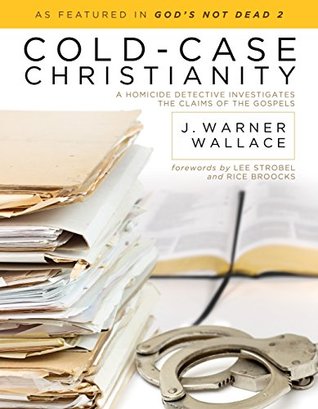More on this book
Community
Kindle Notes & Highlights
“Christianity is a statement which, if false, is of no importance, and, if true, is of infinite importance.
All of us hold presuppositions that can impact the way we see the world around us.
Objectivity is paramount; this is the first principle of detective work that each of us must learn.
The presuppositional belief that only natural laws and forces (as opposed to supernatural forces) operate in the world. Philosophical naturalists believe that nothing exists beyond the natural realm.
Philosophical naturalism rejects the existence of supernatural agents, powers, beings, or realities. It begins with the foundational premise that natural laws and forces alone can account for every phenomenon under examination.
But many of these same historians simultaneously reject the historicity of any of the miracles described in the New Testament, in spite of the fact that these miracles are described alongside the events that scholars accept as historical. Why do they accept some events and reject others? Because they have a presuppositional bias against the supernatural.
he arrived at a particular natural conclusion because he would not allow himself any other option, even though the evidence might be better explained by the very thing he rejects.
When we smuggle our conclusions into our investigation by beginning with them as an initial premise, we are likely to beg the question and end up with conclusions that match our presuppositions rather than reflect the truth of the matter.
I came to a particular conclusion because I started with it as my premise.
This is the truest definition of bias, isn’t it? Starting off with your mind already made up.
Anyone who tells you that he (or she) is completely objective and devoid of presuppositions has another more important problem: that person is either astonishingly naive or a liar.
The question is not whether or not we have ideas, opinions, or
preexisting points of view; the question is whether or not we will allow these perspectives to prevent us from ex...
This highlight has been truncated due to consecutive passage length restrictions.
I failed to differentiate between science (the systematic, rational examination of phenomena) and scientism (the refusal to consider anything other than natural causes).
To infer means “to gather in.”
In logic, inference refers to the process of collecting data from numerous sources, and then drawing conclusions on the basis of this evidence.
In legal terms, an inference is a “deduction of fact that may logically and reasonably be drawn from another fact or group of f...
This highlight has been truncated due to consecutive passage length restrictions.
“reasonable inferences.” These are described as “conclusions which are regarded as logical by reasonable people in the light of their experience in life.”
abductive reasoning (also known as “inferring to the most reasonable explanation”)
THE TRUTH MUST BE FEASIBLE (The explanation has explanatory viability)
available
investigate the alibis
THE TRUTH WILL USUALLY BE STRAIGHTFORWARD (The explanation demonstrates explanatory simplicity)
man or woman who most simply accounts for the evidence.
THE TRUTH SHOULD BE EXHAUSTIVE (The explanation displays explanatory depth)
While a particular suspect may explain one, two, or three pieces of evidence, the suspect who accounts for most (or all) of the evidence is typically the killer.
THE TRUTH MUST BE LOGICAL (The explanation possesses explanatory consistency)
The truth is r...
This highlight has been truncated due to consecutive passage length restrictions.
also make...
This highlight has been truncated due to consecutive passage length restrictions.
THE TRUTH WILL BE SUPERIOR (The explanation achieves explanatory superiority)
unique in the superior way that he or she accounts for the evidence.
far better choice
1. Jesus died on the cross and was buried.
2. Jesus’s tomb was empty and no one ever produced His body. 3. Jesus’s disciples believed that they saw Jesus resurrected from the dead. 4. Jesus’s disciples were transformed following their alleged resurrection observations.
1.
2.
3.
4.
5.
faith is actually the opposite of unbelief, not reason.
Jesus seemed to have a high regard for evidence.
In John 14:11, He told those watching Him to examine “the evidence of the miracles” (NIV) if they did not believe what He said about His identity. Even after the resurrection, Jesus stayed with His disciples for an additional forty days and provided them with “many convincing proofs” that He was resurrected and was who He claimed to be (Acts 1:2–3 NIV).
Jesus understood the role and value of evidence and the importance of develop...
This highlight has been truncated due to consecutive passage length restrictions.
Direct evidence is evidence that can prove something all by itself.
On the other hand, circumstantial evidence (also known as indirect evidence) does not prove something on its own, but points us in the right direction by proving something related to the question at hand.
An explanation derived from circumstantial evidence becomes more reasonable as the collection of corroborating evidence grows and the alternative explanations have been deemed unreasonable.
THE COSMIC CIRCUMSTANTIAL CASE “Causal” Evidence The Cosmological Argument: 1. Anything that begins to exist has a cause. 2. The universe began to exist. 3. Therefore, the universe must have a cause. 4. This cause must be eternal and uncaused. 5. God is the most reasonable explanation for such an uncaused first cause.
A UNIVERSE WITH A BEGINNING
This
“uncaused first cause” must exist outside of space, time, and matter (as nothing has ever been observed to cause itself to exist).


